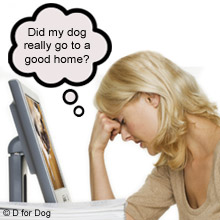Buying or Selling a Dog Online
Selling a dog online? Buying a dog online? Rehoming a dog on an internet site is wrought with dangers. Buyer and seller beware!
by Anna Osborne

The trading of dogs is as old as... well, dogs. Breeders do it, owners do it, rescues do it - we're all at it.
I trade dogs. We shy away from the statement, we hide it under the word ‘rescue’ and say it's the best thing for the animal - but we're all trading.
After speaking with a rescue colleague today, I started thinking about this a lot. She asks a minimal donation for the work that she does and the input that goes into each dog - but her main 'competition' is from free-ads, where instead of sensational honesty by someone invested in creating the best future for the dog, animals are traded as pre-loved or second-hand because, well, rescue dogs are all a bit rubbish, aren't they? Why not get one straight from the totally honest previous family with a genuine reason for sale?
Rather than ask you all to join the screeching gangs demanding the cessation of animal trading on the internet (quiet note to them: just because you can't see it any more, doesn't mean it's not happening - welcome to the internet), I've decided to produce a buyer/seller guide with the cold, hard facts about what to expect when you start trading animals.
First, sellers.
Selling a dog online

At the moment on Gumtree, I can have a Labrador mongrel puppy for £10, or a proven Bulldog bitch with one blue eye! For £250. Lucky old me.
If you want to sell your dog, here are the facts. First, there is a large possibility that your dog, if unneutered, female and of a reasonably desirable breed or crossbreed, then the person who buys it may well use it to churn out litter after litter, until your animal is a husk of the family pet you placed online. Then it will die, hopefully after getting medical attention.
Second, dog fighters buy pets to use as bait animals. This is not hyperbole, and it applies to everything from rabbits and ferrets to dogs and cats. The likelihood is, anyone who buys an animal from an online ad and a couple of pictures is not going to be the adoring and capable home you were hoping for. If you're going to sell your dog online anyway, the following in no way guarantees the safety of your dog post-sale but it might give you an idea for things to look out for:
1) Why are you getting rid of the dog?
Be honest, and also be honest with yourself. If you've got yourself into some terrible situation and can't see the wood for the trees, then take 20 minutes and work out all the reasons you're doing this. If it's a training issue, phone some trainers and rescues and see what help is available to you. If it's domestic violence or a prison-term, then contact some of the big charities and see if there is back-up for you (for example, Dogs Trust has a scheme for people fleeing domestic violence, and some shelters offer sanctuary if you or someone you live with is currently at her Majesty's pleasure). If you're moving to council or private accommodation, there is provision for pets if you use your brain and get a decent advocate. If the dog is now 'too big' or you're just bored of it, then you are a contemptible idiot.
2) Call breeders

If trading your dog is your choice after all that, then your first port of call is actually not the free-ads. If your dog is a specific breed or desirable cross, look up breeders, start making some calls and see if any of them have a waiting list, or people who can't afford their asking price - when someone wants a dog, their first call is a breeder, their second is the free-ads. If you're lucky and the breeder is a good person, they will have done a lot of the homework for you and may even have some great advice for you, or be able to point you to a breed-specific forum full of people who know and love the breed.
3) Call breed rescues
Again, if your dog is a breed or desirable cross, ring round some breed-specific rescues, or email them (we don't pick up our phones much, as we're usually quite busy dealing with all the dogs someone sold on the free-ads), and take advice. Be prepared for a bit of flak, but take it politely and in good grace and someone might make time for you.
If you still end up on the free-ads, and genuinely want the best chance for your dog not to end up as a breeding machine, bait dog, or in the hands of a total muppet, then here are the gifts you must give it:
Neutering
Many, many places offer free or subsidised neutering in your area, so get Googling. That simple procedure just made your dog useless to a huge percentage of online sharks.
Honesty
If your dog really shouldn't be allowed within 50 feet of a toddler, then let people know. If you're in possession of a really awesome dog and you're after the right home because of a change of circumstance - let people know. Pregnancy is not a reason to rehome a dog; it just makes you sound both desperate and a bit stupid.
Questionnaire
- Have a questionnaire on your advert, based on what you know about your own pet. Explain what you are already paying in insurance and ask if the potential buyer has budgeted for that.
- Explain that the microchip in your dog will have to be changed (usually around £10) and request an address and proof of that address. If a buyer can't give you that, ask yourself why.
- Explain what you know about your dog - ask buyers if they have the experience to deal with that.
- Look up breed-related health problems and ask buyers if they understand that their new purchase may eventually suffer from one of them.
- Explain what your pet is afraid of and how you combat that.
- Ask buyers to submit a short email detailing their situation and intentions towards the dog.
- Ask buyers if they mind you visiting their home.
Things not to do!
Do not list your dog as a rare colour, or list any weird features it has (one blue eye!). Do not say your dog is good with children - instead say that he has lived with children, which is totally different.
Dogs are property. When you sell them, they are covered by the Sale of Goods Act. If you intentionally mislead people, you can get into deep doodoo. Stick to what you know, not what will sell the dog. (Just a side-note: blue Corsos are not rare!)
By being honest, you may get fewer emails and responses, but you may, just may, be a bit luckier and find someone who genuinely wants a family pet for life.
Buying a dog online
No matter how impartial I want this to be - please don't buy a dog online. Ever. If you must, ask lots and lots of questions.
- Request that vet records are sent to your vet.
- Ask to see the dog’s microchip paperwork. Check the number and see if the dog has been stolen or is registered lost.
- Check out if the owner has a clue about the breed of dog they have. If they don't, do you trust them to sell you an animal honestly?
- Ask for an email detailing any bites and the circumstances they happened under.
- Visit the dog more than once. Trust your gut.
- Don't ever let desperation for a dog get in the way of common sense and research - if the previous owner had done that, the dog might not be for sale.
- Remember that KC registration means nothing. Pedigrees mean nothing. Champion bloodlines mean nothing. If you don't believe me, then Google those three statements. KC registration is the same as me telling you I've joined a gym: it doesn't make me fit; I pay my money and I either work out or I eat pizza in the canteen. A pedigree is a family tree - which can contain 15 generations of epileptic dogs! Champion bloodlines mean absolutely nothing: my dog is a champion spider catcher - ergo her offspring are champion bloodlines.
- Grill the person selling the dog. There is an old adage in rescue and it's as true now as it ever was - no one gives up a good dog. Find out why it's being sold.
- If the dog is in poor conditions and you arrive and pay £50 for it - you are not rescuing him. You are funding an abuser. Report it, and keep reporting it.
- If the dog appears lame, wonky on the back end or otherwise not OK, walk the hell away.
Think before you buy.
Author Anna Osborne is one of the founders of Iron Mountain, a UK-wide organisation that specialises in large and bullbreed training and rescue.
With huge thanks to Anna and Dogs Today magazine for allowing us to reproduce this article.
© This article is the property of the author, Anna Osborne, and is not for reproduction or replication in any way. It has been published here with the permission of Dogs Today magazine.
